Related Research Articles

The Statute of Anne, also known as the Copyright Act 1709 or the Copyright Act 1710, was an act of the Parliament of Great Britain passed in 1710, which was the first statute to provide for copyright regulated by the government and courts, rather than by private parties.

The Index Librorum Prohibitorum was a changing list of publications deemed heretical or contrary to morality by the Sacred Congregation of the Index ; Catholics were forbidden to print or read them, subject to the local bishop. Catholic states could enact laws to adapt or adopt the list and enforce it.
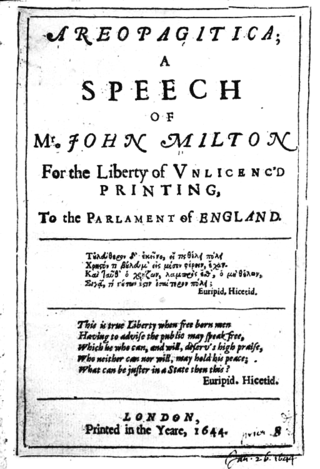
Areopagitica; A speech of Mr. John Milton for the Liberty of Unlicenc'd Printing, to the Parlament of England is a 1644 prose polemic by the English poet, scholar, and polemical author John Milton opposing licensing and censorship. Areopagitica is among history's most influential and impassioned philosophical defences of the principle of a right to freedom of speech and expression. Many of its expressed principles have formed the basis for modern justifications.
The history of copyright starts with early privileges and monopolies granted to printers of books. The British Statute of Anne 1710, full title "An Act for the Encouragement of Learning, by vesting the Copies of Printed Books in the Authors or purchasers of such Copies, during the Times therein mentioned", was the first copyright statute. Initially copyright law only applied to the copying of books. Over time other uses such as translations and derivative works were made subject to copyright and copyright now covers a wide range of works, including maps, performances, paintings, photographs, sound recordings, motion pictures and computer programs.
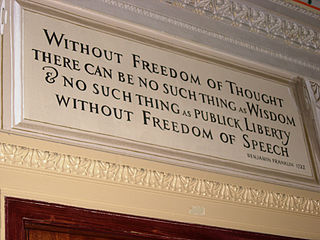
Freedom of thought is the freedom of an individual to hold or consider a fact, viewpoint, or thought, independent of others' viewpoints.
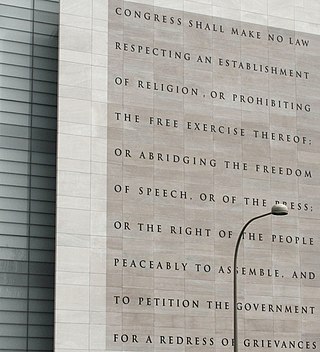
In the United States, freedom of speech and expression is strongly protected from government restrictions by the First Amendment to the U.S. Constitution, many state constitutions, and state and federal laws. Freedom of speech, also called free speech, means the free and public expression of opinions without censorship, interference and restraint by the government. The term "freedom of speech" embedded in the First Amendment encompasses the decision what to say as well as what not to say. The Supreme Court of the United States has recognized several categories of speech that are given lesser or no protection by the First Amendment and has recognized that governments may enact reasonable time, place, or manner restrictions on speech. The First Amendment's constitutional right of free speech, which is applicable to state and local governments under the incorporation doctrine, prevents only government restrictions on speech, not restrictions imposed by private individuals or businesses unless they are acting on behalf of the government. However, It can be restricted by time, place and manner in limited circumstances. Some laws may restrict the ability of private businesses and individuals from restricting the speech of others, such as employment laws that restrict employers' ability to prevent employees from disclosing their salary to coworkers or attempting to organize a labor union.
Prior restraint is censorship imposed, usually by a government or institution, on expression, that prohibits particular instances of expression. It is in contrast to censorship that establishes general subject matter restrictions and reviews a particular instance of expression only after the expression has taken place.
France has a long history of governmental censorship, particularly in the 16th to 19th centuries, but today freedom of press is guaranteed by the French Constitution and instances of governmental censorship are limited.
Censorship in Iraq has changed under different regimes, most recently due to the 2003 invasion of Iraq.
Germany has taken many forms throughout the history of censorship in the country. Various regimes have restricted the press, cinema, literature, and other entertainment venues. In contemporary Germany, the Grundgesetz generally guarantees freedom of press, speech, and opinion.
Censorship was an essential element of Portuguese national culture throughout the country's history up until the Carnation Revolution in 1974. From its earliest history Portugal was subject to laws limiting freedom of expression. This was mainly due to the influence of the Church since the time of Ferdinand I, who requested that Pope Gregory XI institute episcopal censorship. Later, the censorship would also apply to the publication of other written works. Portuguese citizens still remember the Estado Novo's censorship policy, institutionalizing strict control over the media, resorting to measures used previously against newspapers and systematic sequestering of books. In fact, every political regime was very careful with the legislation related to the area of press freedom—in most cases restricting it. In the five centuries of the history of Portuguese press, four were marked by censorship.

The Licensing of the Press Act 1662 was an Act of the Parliament of England with the long title "An Act for preventing the frequent Abuses in printing seditious treasonable and unlicensed Books and Pamphlets and for regulating of Printing and Printing Presses". Having expired in 1695, it was officially repealed by the Statute Law Revision Act 1863, which repealed a large set of superseded acts.
Censorship in Myanmar results from government policies in controlling and regulating certain information, particularly on religious, ethnic, political, and moral grounds.

The Edict of Châteaubriant, issued from the seat of Anne, duc de Montmorency in Brittany, was promulgated by Henri II of France, 27 June 1551. The Edict was one of an increasingly severe series of measures taken by Henry II against Protestants, whom he regarded as heretics. In the preamble, the Edict frankly reported that previous measures against heresy in the kingdom had proved ineffectual. "Heretics", the Edict reported, met in conventicles, infected schools, invaded the judicial bench and forced toleration upon judges. To ensure more rigorous judgements, in 1547 Henri had already created a special judicial chamber drawn from members of the parlements, solely to judge cases of heresy (called by Protestants the Chambre Ardente. The Edict contained quite detailed provisions: it called upon the civil and ecclesiastical courts to detect and punish all heretics, and placed severe restrictions on Protestants, including loss of one-third of property granted to informers, who were also granted immunity and confiscations of property both moveable and immovable belonging to those who had fled to Geneva, with whom the king's subjects were forbidden to correspond or to send money. Fourteen of its forty-six articles were concerned with censorship; its terms strictly regulated the press by prohibiting the sale, importation or printing of any book unapproved by the Faculty of Theology at the University of Paris, then or, now it was implied, in the future. Booksellers were to display a copy of the Faculty's printed list of prohibited books alongside a list of books for sale. Delegates of the Faculty were to make visits twice a year to each bookseller to ensure that the provisions were complied with. Since 1542 it had been a requirement that any shipment of books into France be opened and unpacked in the presence of delegates from the Faculty of Theology, which now, according to Roger Doucet, "assumed the intellectual direction of the kingdom."
Censorship in Japan has taken many forms throughout the history of the country. While Article 21 of the Constitution of Japan guarantees freedom of expression and prohibits formal censorship, effective censorship of obscene content does exist and is justified by the Article 175 of the Criminal Code of Japan. Historically, the law has been interpreted in different ways—recently it has been interpreted to mean that all pornography must be at least partly censored, and a few arrests have been made based on this law.

Freedom of speech is a principle that supports the freedom of an individual or a community to articulate their opinions and ideas without fear of retaliation, censorship, or legal sanction. The right to freedom of expression has been recognised as a human right in the Universal Declaration of Human Rights and international human rights law by the United Nations. Many countries have constitutional law that protects free speech. Terms like free speech, freedom of speech, and freedom of expression are used interchangeably in political discourse. However, in a legal sense, the freedom of expression includes any activity of seeking, receiving, and imparting information or ideas, regardless of the medium used.
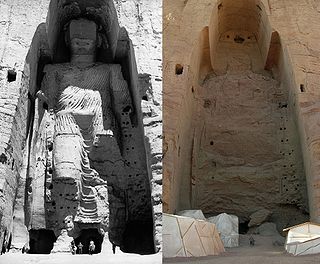
Religious censorship is a form of censorship where freedom of expression is controlled or limited using religious authority or on the basis of the teachings of the religion. This form of censorship has a long history and is practiced in many societies and by many religions. Examples include the Edict of Compiègne, the Index Librorum Prohibitorum and the condemnation of Salman Rushdie's novel The Satanic Verses by Iranian leader Ayatollah Ruhollah Khomeini.
In the Russian Empire, government agencies exerted varying levels of control over the content and dissemination of books, periodicals, music, theatrical productions, works of art, and motion pictures. The agency in charge of censorship in the Russian Empire changed over time. In the early eighteenth century, the Russian emperor had direct control, but by the end of the eighteenth century, censorship was delegated to the Synod, the Senate, and the Academy of Sciences. Beginning in the nineteenth century, it fell under the charge of the Ministry of Education and finally the Ministry of Internal Affairs.
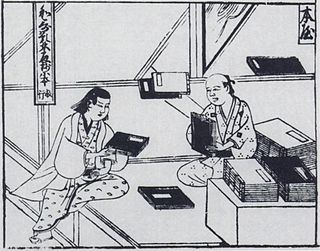
The selling of books dates back to ancient times. The founding of libraries in c.300 BC stimulated the energies of the Athenian booksellers. In Rome, toward the end of the republic, it became the fashion to have a library, and Roman booksellers carried on a flourishing trade.
Censorship in Poland was first recorded in the 15th century, and it was most notable during the Communist period in the 20th century.
References
- This article incorporates text from a publication now in the public domain : Chisholm, Hugh, ed. (1911). "Press Laws". Encyclopædia Britannica (11th ed.). Cambridge University Press.